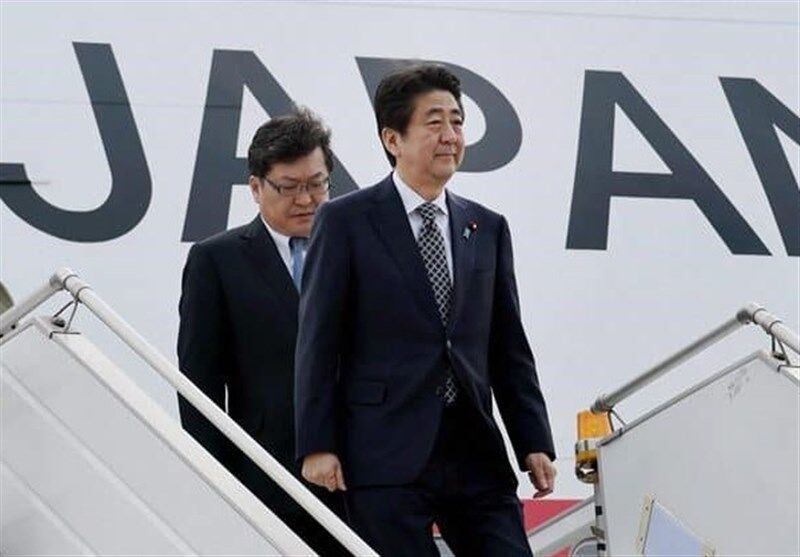
In recent days, some informed sources announced that the visit by Japan's prime minister to Iran will be for three days and it will begin on June 13 and will continue until June 15. One of points of Abe's visit to Tehran which is noteworthy is that it will be the first visit by a Japanese prime minister to Iran in 40 years.
A lot of details about the purpose of the trip has n not been released, but according to Japanese government spokesman Yoshihide Suga, Abe will meet with Supreme Leader of the Islamic Revolution Ayatollah Seyyed Ali Khamenei and President Hassan Rouhani as observers believe the talks in addition to examining bilateral relations will revolve around the tensions between Iran and the US. So there are speculations that he is going to reduce the differences and open the door for negotiations.
Abe's trip to Tehran will take place right after Trump's visit to Japan. Based on overview of the talks between the US president and the Japanese prime minister, one can conclude that Abe will travel to Tehran, encouraged by Trump to open negotiations ground with Iran.
The soft and flexible position of Trump in Japan has attracted attention of the world. He said in an unprecedented comment that "Iran has the chance to become a great country with this government and we are not looking for a regime change," statements that could be considered the green light to negotiate with Iran.
He also once again expressed his enthusiasm for negotiating with Iran, and emphasized, "I believe Iran is willing to negotiate, and if they want to negotiate, we want it."
For this reason, many experts believe that Abe will come to Tehran pursuing to ease tensions between Tehran and Washington, which Trump explicitly stated during his trip to Japan, "I know well that the prime minister of Japan has a very close relationship with leaders of Iran and we will see what will happen; The remarks that have made Abe known as a mediator.
Experts believe that mediation efforts have increased by some regional and trans-regional countries since the White House has given up conditional negotiation and raised the negotiation without preconditions.
On Monday, Iran will host the German Foreign Minister, Heiko Maas, a trip that is said to be destined to save the JCPOA and ease tension between Iran and the United States. In addition to Japan and Germany, Switzerland, Iraq, Oman, Pakistan have also announced readiness to deal with decreasing the tensions between Iran and the United States.
US Secretary of State Mike Pompeo determined 12 preconditions for a re-negotiation with Tehran after his country's withdrawal from the JCPOA, but has now been forced to retreat. Stopping uranium enrichment, shutting down the heavy water reactor in Arak, allowing full and unconditional access to the IAEA for the inspection of all sites throughout Iran, the end of the ballistic missile program, the release of all American citizens and its allies, the abandonment of Iran's support for Hezbollah, Hamas and the Islamic Jihad, Iran's withdrawal from Syria were just a few of those conditions.
America's failure to negotiate with a precondition pushed them back one step to waive their conditions and call for negotiations without any preconditions. Trump, who had previously emphasized talks with the Supreme Leader, has just stepped back and is talking about negotiating with his Iranian counterpart.
Officials of the Islamic Republic of Iran, but so far, have not welcomed the negotiation with preconditions or without preconditions. Their distrust of the United States has a forty-year-old history, and is not restricted to the Trump government and his violation of commitments.
From the point of view of our state's top officials and authorities, Trump concurrently welcomes the negotiation concurrent with a pressure and sanctions tool, which with the use of these two tools at the same time to increase the mistrust.
In May, Iran's Supreme Leader in his meeting with the country's senior officials referred to negotiation with the United States as poison and emphasized that the definitive option of the Iranian nation in dealing with the enemy is resistance in all areas.
These words of the Supreme Leader were again repeated with different literature on the eve of Quds Day. On May 29 in a three-hour meeting with thousands of faculty members and universities professors, Ayatollah Khamenei emphasized that "negotiation is the US tactics to complete the strategy of exerting pressure on Iran".
The incident was also repeated on Friday, and some media outlets announced new sanctions against Iran's petrochemicals. The US Treasury Department is said to have placed several petrochemical companies, including Persian Gulf petrochemical companies, Fajr, Pars, Orumieh, etc., on its sanctions list.
This is not the first time the United States has targeted the Iranian petrochemical industry, but the imposition of these sanctions is more symbolic than the real concurrence in the presence of mediators in Tehran, indicating the continuation of the maximum pressure policy on Tehran.
The coincidence of the threat, as well as the willingness to negotiate, is an inefficient policy, and it eliminates the likelihood of the outcome and the elimination of tension, as it has never produced any result.
Experts believe that although the political strives of some mediating figures such as the Prime Minister of Japan, who has particular popularity in Iran and the United States, can be effective, but more importantly, the United States must change its policies and treat it equally and respectfully with Tehran.
9455**2050
Follow us on Twitter @IrnaEnglish
IRNA English solhkhabar | Peace International News Agency Peace International News Agency , Peace News , International Agency News of Peace
solhkhabar | Peace International News Agency Peace International News Agency , Peace News , International Agency News of Peace